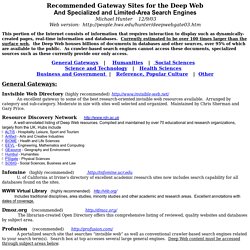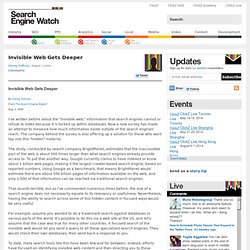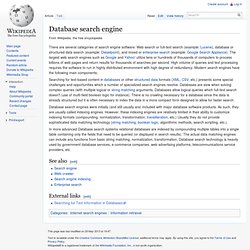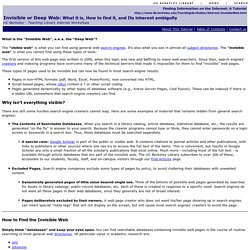

Search techniques - Lifehacker. The Invisible Web: A Beginners Guide to the Web You Don't See. By Wendy Boswell Updated June 02, 2016.

The Ultimate Guide to the Invisible Web. Search engines are, in a sense, the heartbeat of the internet; “Googling” has become a part of everyday speech and is even recognized by Merriam-Webster as a grammatically correct verb.

It’s a common misconception, however, that Googling a search term will reveal every site out there that addresses your search. Typical search engines like Google, Yahoo, or Bing actually access only a tiny fraction — estimated at 0.03% — of the internet. Special: Seek and Ye Shall Find. Recommended Gateway Sites for the Deep Web. Recommended Gateway Sites for the Deep Web And Specialized and Limited-Area Search Engines This portion of the Internet consists of information that requires interaction to display such as dynamically-created pages, real-time information and databases.

Currently estimated to be over 100 times larger than the surface web, the Deep Web houses billions of documents in databases and other sources, over 95% of which are available to the public. As crawler-based search engines cannot access these documents, specialized sources such as these currently provide our only access. General Gateways | Humanities | Social Sciences Science and Technology | Health Sciences Business and Government | Reference, Popular Culture | Other General Gateways: Deep Web Research. Invisible Web Gets Deeper. By Danny Sullivan From The Search Engine Report Aug. 2, 2000 I've written before about the "invisible web," information that search engines cannot or refuse to index because it is locked up within databases.

Now a new survey has made an attempt to measure how much information exists outside of the search engines' reach. The company behind the survey is also offering up a solution for those who want tap into this "hidden" material. The study, conducted by search company BrightPlanet, estimates that the inaccessible part of the web is about 500 times larger than what search engines already provide access to. To put that another way, Google currently claims to have indexed or know about 1 billion web pages, making it the largest crawler-based search engine, based on reported numbers. That sounds terrible, but as I've commented numerous times before, the size of a search engine does not necessarily equate to its relevancy or usefulness.
Database search engine. There are several categories of search engine software: Web search or full-text search (example: Lucene), database or structured data search (example: Dieselpoint), and mixed or enterprise search (example: Google Search Appliance).

The largest web search engines such as Google and Yahoo! Utilize tens or hundreds of thousands of computers to process billions of web pages and return results for thousands of searches per second. High volume of queries and text processing requires the software to run in highly distributed environment with high degree of redundancy. Invisible Web. Semantic Web. The Semantic Web is a collaborative movement led by international standards body the World Wide Web Consortium (W3C).[1] The standard promotes common data formats on the World Wide Web.

By encouraging the inclusion of semantic content in web pages, the Semantic Web aims at converting the current web, dominated by unstructured and semi-structured documents into a "web of data". The Semantic Web stack builds on the W3C's Resource Description Framework (RDF).[2] According to the W3C, "The Semantic Web provides a common framework that allows data to be shared and reused across application, enterprise, and community boundaries".[2] The term was coined by Tim Berners-Lee for a web of data that can be processed by machines.[3] While its critics have questioned its feasibility, proponents argue that applications in industry, biology and human sciences research have already proven the validity of the original concept.
History[edit] Purpose[edit] Limitations of HTML[edit] How Deep Is The web. Deep Web. The Invisible Web. 10 Search Engines to Explore the Invisible Web. Not everything on the web will show up in a list of search results on Google or Bing; there are lots of places that their web crawlers cannot access. To explore the invisible web, you need to use specialist search engines. Here are our top 12 services to perform a deep internet search. What Is the Invisible Web?
Before we begin, let's establish what does the term "invisible web" refer to? Simply, it's a catch-all term for online content that will not appear in search results or web directories. Invisible Web: What it is, Why it exists, How to find it, and Its inherent ambiguity. What is the "Invisible Web", a.k.a. the "Deep Web"?

The Best Reference Sites. Whether you're looking for the average rainfall in the Amazon rainforest, researching Roman history, or just having fun learning to find information, you'll get some great help using my list of the best research and reference sites on the Web. About.com: I've found many answers to some pretty obscure questions right here at About.Reference.com.Extremely simple to use, very basically laid out.Refdesk.com.Includes in-depth research links to breaking news, Word of the Day,and Daily Pictures. A fun site with a ton of information.Encyclopedia.com. As stated on their site, Encyclopedia.com provides users with more than 57,000 frequently updated articles from the Columbia Encyclopedia, Sixth Edition.Encyclopedia Brittanica.
One of the world's oldest encyclopedias online.Encarta.Put together by Microsoft. I like Encarta because it's very easy to use.Open Directory Reference. Deep Web Research 2009. Bots, Blogs and News Aggregators is a keynote presentation that I have been delivering over the last several years, and much of my information comes from the extensive research that I have completed into the “invisible” or what I like to call the “deep” web.

The Deep Web covers somewhere in the vicinity of 1 trillion pages of information located through the World Wide Web in various files and formats that the current search engines on the Internet either cannot find or have difficulty accessing. Search engines find about 20 billion pages at the time of this publication. In the last several years, some of the more comprehensive search engines have written algorithms to search the deeper portions of the world wide web by attempting to find files such as .pdf, .doc, .xls, ppt, .ps, and others. These files are predominately used by businesses to communicate information within their organization, or to disseminate information to external communities. Invisible Web Directory. Deep Web Research 2012. Bots, Blogs and News Aggregators ( is a keynote presentation that I have been delivering over the last several years, and much of my information comes from the extensive research that I have completed over the years into the "invisible" or what I like to call the "deep" web.

The Invisible Web. What is the Invisible Web?

How can you find it online? What makes the Invisible Web search engines and Invisible Web databases so special? How to use Google for Hacking. Google serves almost 80 percent of all search queries on the Internet, proving itself as the most popular search engine. However Google makes it possible to reach not only the publicly available information resources, but also gives access to some of the most confidential information that should never have been revealed.
In this post I will show how to use Google for exploiting security vulnerabilities within websites. The following are some of the hacks that can be accomplished using Google. 1. Hacking Security Cameras There exists many security cameras used for monitoring places like parking lots, college campus, road traffic etc. which can be hacked using Google so that you can view the images captured by those cameras in real time. Invisible Web. "The Invisible Web" by Chris Sherman. Deep Web.